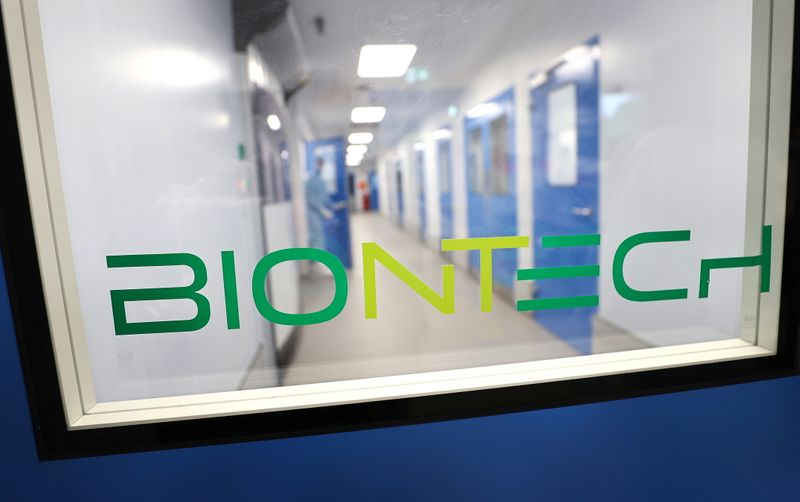By Ludwig Burger and Caroline Copley
BERLIN (Reuters) -BioNTech plans to set up a regional centre and a new factory in Singapore for its vaccines, it said on Monday, boosting its presence in Asia as a debate over patents rages and pressure grows on drugmakers to raise output of COVID-19 shots.
Governments are looking to build up local vaccine production to secure access to supplies after manufacturing setbacks have slowed the rollout of COVID-19 doses in some countries.
The Singapore facility will "address potential pandemic threats" in southeast Asia and will increase BioNTech's global supply capacity of product candidates - also beyond vaccines - based on messenger RNA (mRNA) technology, BionTech said.
MRNA vaccines, like BionTech and Pfizer (NYSE:PFE)'s COVID-19 shot, prompt the human body to make a protein that is part of the virus, triggering an immune response.
The German biotech company said the Singapore factory will have an estimated annual capacity of several hundred million doses of its mRNA vaccines depending on the specific type, once it is operational in 2023.
"Having multiple nodes in our production network is an important strategic step in building out our global footprint and capabilities," said Ugur Sahin, CEO and co-founder of BioNTech.
He told a press conference that the investment amounted to hundreds of millions of dollars, declining to be more specific.
BioNTech Chief Strategy Officer Ryan Richardson said there were ongoing discussions with countries around the world about more production sites but added the Singapore decision was exceptional.
"We made a unique long-term commitment to Singapore," following more than a year of talks with the country, he added.
CHINA VENTURE
Leading vaccine makers have come under growing pressure to free up their COVID-19 vaccine patents to aid poor countries. BioNTech and other vaccine makers have said they were already transferring vital production knowledge to other parts of the world.
BioNTech and Pfizer are jointly commercializing the vaccine worldwide, excluding China, Macau, Hong Kong and Taiwan, which are covered by BioNTech’s collaboration with Fosun Pharma.
BioNTech and Fosun Pharma have done clinical trials in China but Fosun had not started producing the vaccine, which has yet to be granted approval there.
Fosun said on Sunday it would provide a factory with an annual capacity to make up to 1 billion doses of the COVID-19 vaccine under a joint venture with BioNTech.
This marks a step closer for China to have localized manufacturing capability for the German firm's vaccine. Five domestically-developed COVID-19 vaccines are being used in the country, while no foreign ones have gained regulatory approval.
BioNTech plans to open the Singapore office in 2021 and expects the manufacturing site to be operational by 2023, creating up to 80 jobs in Singapore.

The establishment of a southeast Asia regional hub, which is supported by the Singapore Economic Development Board, comes after BioNTech, based in Mainz, Germany, set up a U.S. headquarters in Cambridge, Massachusetts in 2020.
BioNTech has said it and Pfizer would have capacity to produce up to 3 billion doses in 2021. Pfizer said last week the pair was targeting production of 4 billion doses next year, mostly for low- and middle-income countries.